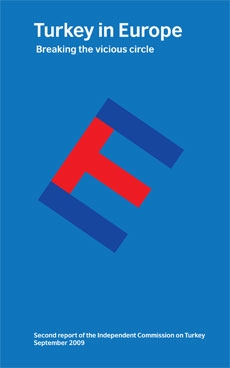| Weşan : Commission Indépendante | Tarîx & Cîh : 2009, İstanbul |
| Pêşgotin : | Rûpel : 28 |
| Wergêr : | ISBN : 978-605-5659-06 |
| Ziman : Îngilîzî | Ebad : 347x240 mm |
| Mijar : Siyaset |
|
Danasîn
|
Naverok | Pêşgotin | Nasname | ||
 Versions
Turkey in Europe - Breaking the vicious circle - Second report of the Independent Commission on Turkey Is Turkey’s EU accession process grinding to a halt? Did open opposition to Turkish membership by some European leaders cause the slow-down of Turkey’s reform process in recent years, or was it the Ankara government’s lack of resolve? Is there a danger of “creeping Islamisation” in Turkish society? What are the chances for solving the Kurdish question, the Cyprus problem and the differences with Armenia? Can Turkey’s important new geo-political role in the region be an asset for the European Union? These and other questions are answered in this report of the Independent Commission on Turkey. The Independent Commission was established by prominent European politicians for the purpose of analysing some of the most pressing aspects of Turkey’s accession to the EU. Its first report Turkey in Europe: More than a Promise? was issued in September 2004. | |||||
| Introduction The Independent Commission on Turkey was established in March 2004 by a group of concerned Europeans, deeply committed to the integration process and having held high public office, for the purpose of contributing to a more objective and rational debate on Turkey’s accession to the European Union. In its first report, Turkey in Europe: More than a Promise?, published in September 2004, the Independent Commission examined the long history of Turkey’s convergence with Europe as well as the major opportunities and challenges connected with Turkey’s possible EU membership. It concluded that accession negotiations should be opened without delay upon fulfilment by Turkey of the Copenhagen Criteria. Turkey’s European vocation and its eligibility for membership in the EU having been reconfirmed by European governments many times during past decades, any further delay would have been seen as a blatant breach of commitments made and would have seriously damaged the Union’s credibility. Moreover, while the accession of a country with the size and specific characteristics of Turkey would doubtlessly present the EU with substantive challenges, it argued that these were by no means insurmountable. On the other hand, the accession of a transformed, democratic and modern Turkey, a country in a unique geo–strategic position with great economic potential and a young and dynamic workforce, would bring considerable benefits to the European Union. The Independent Commission welcomed the European Council decision in December 2004 to open accession negotiations with Turkey and the start of talks in October 2005. Regrettably, negative reactions since then from European political leaders and growing hesitation by the European public about further enlargement, have given Turkey the impression that it is not welcome, even if it were to fulfil all membership conditions. Moreover, the process itself has been hindered by the effective blockage of more than half of the negotiating chapters. Support in Turkey has faded for both the EU accession process and the implementation of difficult and sometimes expensive reforms. This was aggravated by internal political difficulties, in which the ruling Justice and Development Party (AKP) found itself under serious pressure from emboldened Turkish Euro-sceptics who, partly under the guise of defending secular principles against a supposed advance of Islamism, attempted to delay the implementation of political and social reforms needed for EU membership. Lack of Turkish reforms triggered more European opposition to Turkey’s accession. The sense of being excluded further demoralized Turkish reformers, thus creating a vicious circle. This vicious circle is now undermining the many achievements over the past decade inspired by Turkey’s convergence with the EU. In particular, progress has stalled in strengthening democracy, broadening respect for human rights and building up a free and vibrant civil society. The new dynamism experienced by the Turkish economy has slowed, aggravated by the global economic crisis, as has the dramatic increase of foreign direct investment experienced after the talks started. On the other hand, Turkey’s new charisma and prosperity have made it increasingly attractive to nearby countries and its proactive regional policy has proved that an EU-anchored Turkey can project stability into volatile areas of its neighbourhood in the Caucasus and Middle East. This is the backdrop of the present report, in which the Independent Commission analyses developments in the EU and Turkey since the opening of negotiations as well as issues important for Turkey’s accession process. As with its first report in 2004, the present publication by the Independent Commission represents the personal views of its members, and does not intend to duplicate the European Commission’s forthcoming annual progress report. Finally, it is with great sadness that the Independent Commission on Turkey records the untimely death in 2008 of its fellow commission member Bronisław Geremek, former Foreign Minister of Poland, whose valuable contribution to the work of the Independent Commission was highly appreciated.
| ||||